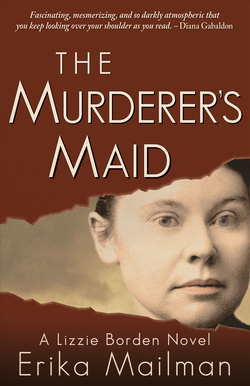Читать книгу The Murderer's Maid - Erika Mailman - Страница 11
На сайте Литреса книга снята с продажи.
ОглавлениеCHAPTER 4
Bridget
NOVEMBER 10, 1889
That night, Bridget blew out her lamp and went to the window. There was comfort in the closeness of the homes: the Churchills, unseen, to the north and, visible now, the lights of the Kellys, an Irish family that had somehow clambered up to respectability. She got into bed and closed her eyes.
But they opened.
She peered through the gloom. It was unsettling knowing that outside her door was the attic, open for the entire footprint of the house. Besides one small bedroom, a counterpart to her own, the enormous space was uncontrolled by walls. She didn’t like the thought of the asymmetric towers of crates and discarded, hulking furniture, the mice that made their nests there, the unknowingness.
Directly below her were Mr. and Mrs. Borden, and she could hear them readying for bed, the wife’s labored steps across the floor, the bed creaking as she sat to take off her shoes. The low murmur of husband and wife surprised her; after the stillness between Abby and her stepdaughters it almost seemed extraordinary that these two spoke to each other.
Bridget craned her head to catch a glimpse of the moon as she lay inhaling the cheap soap scent on her pillowslip, everything unfamiliar. She permitted her mind to drift back to her mother, surely awake now whatever her hour, bracing herself against the stiff wind off Ballydonegan Bay as she walked, skirts flapping, to old Mrs. Twomey’s for a packet of currants for her soda bread. It had been years since Bridget had seen her mother, and she begged God nightly to keep her well until she could see her again . . . yet the loss felt suddenly so raw that Bridget succumbed to tears.
There was no warmth, no hearth, no tales. No lingering by the fire of an evening, as the knitting needles clicked out friendly accompaniment to accounts told of the day. This family ate in shifts to not be with each other. Bridget served and cleared, served and cleared. She witnessed the contempt that had taken up residence in the eyes, there so long that it was a permanent lodger.
She pitied Lizzie and Emma the death of their mother, especially Lizzie’s having been so young and helpless. She imagined the young toddler might not have even been readied to use the chamber pot yet, and how Mr. Borden might have shrank from the womanly chores demanded of a widower. Emma must have taken on those duties, and herself a child, too. Perhaps these women’s coldness arose, Bridget thought, from this long-ago grief. Young Lizzie’s understanding of the world had been that all good things may be snapped out of one’s hands with an instant’s notice.
But knowing the route a character took in forming itself didn’t absolve it of its faults. How unfair that she who loved her mother so deeply must find an ocean between them, while in the same household people who cared not a grain for each other walked and ate in troubled circuits. Bridget wiped her tears on the sleeve on her nightgown, which still smelled of the lavender soap the Remingtons used in their laundering; she might never wash it again.
In Bridget’s trunk was a bit of blue copper from the mines her da worked. She wasn’t sure he was supposed to take it, but he’d never be caught for it now, the evidence of his crime having sailed all the way to America. The mine had closed two years before she’d sailed to the States, her father’s loss of livelihood a strong signal that she needed to help the family pay its bills. As one of thirteen children, two of whom had died young, she was simply another mouth to feed. So she’d shipped off. She could hide her father’s spiriting away of the copper. She could keep a closed mouth, as any good servant.
She was the girl who could listen to gossip but never donate any.
